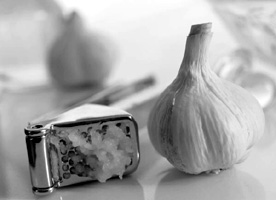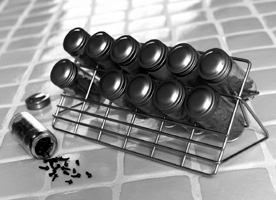 Welcome to the Basics. Welcome to the Basics.
These are the 3 essential techniques to always remember when you take on any dish preparation. In addition to the basics outlined below, you will also find in this section:
 To truly make an impression on your guests and enhance your cooking abilities, I offer these suggestions that I find imperitive to producing a memorable dining experience. To truly make an impression on your guests and enhance your cooking abilities, I offer these suggestions that I find imperitive to producing a memorable dining experience.
1. Salt, pepper, and vinegar are your best seasonings. Whether you’re preparing pasta or rice, boiling potatoes or whatever, always add salt during the cooking process. It enhances the flavor of the product, especially when cooking starches, grains, and blanching vegetables. When cooking grains, pastas, or boiling potatoes, add salt to taste. When blanching vegetables, add enough to make the water as salty as seawater. This allows the salt to penetrate the vegetable. Never use table salt, always use either, coarse kosher or sea salt. As far as pepper is concerned, I use at least a little bit of it in almost everything. Be cautious in adding it to rice and other starches, it can become too overpowering very quickly. The most important time to use pepper is when grilling any meats. The smokey flavor from the coals blend with the pepper well. Vinegar is one of the many "trade secrets" in professional cooking. A few drops added to a finished sauce rounds out the flavors. Acidity added at the right time and incriments really brings out the full flavor of the finished product.
 2. Always use fresh herbs. (click here to visit the Herbs & Spices page) 2. Always use fresh herbs. (click here to visit the Herbs & Spices page)
I cannot stress this enough. Using fresh herbs and knowing when to use them is one of the keys to an outstanding meal. The finest restaurants in the world rely on fresh herbs from their purveyors or gardens to give their foods the wonderful flavor that they have.
If you remember some of the best meals you’ve ever had at a restaurant, chances are that it was due, partially, to fresh herbs. Dry herbs should only be used in stocks, soups or if fresh herbs are unavailable. The optimum time to add an herb is right before serving. This gives the full amount of flavor. If left in to cook too long, the flavor can dissipate from the dish. Also, when using fresh herbs, use three times as much as you would dry herbs. The drying process concentrates the flavors but also diminishes them in a short amount of time. Refer to fresh herbs for more information.
3. The use of stocks. (click here to Learn the basics of making Stocks)
Whenever possible, substitute the use of water in a dish for stock. For instance, a chicken or vegetable stock in preparing rice, whether it is simply cooking white rice or something more complex like risotto. The amount of flavor added will astound you. Refer to stocks for more information. 
| 


